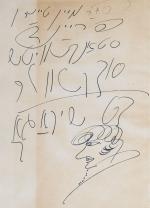Sutzkever, In Fayervogn.
In Fayervogn.
First Edition. Israel, 1952. 17.8 cm x 24.5 cm. 184 (3) pages. Original Hardcover with illustrated dustjacket in protective Mylar. Very good condition of the volume itself with only minor signs of external wear and a small chip to the spine. The rare dustjacket with fraying and some larger chips, but now protected by Mylar. Wonderfully inscribed by Sutzkever and with a little drawing on the endpaper. Extremely rare yiddish publication.
Abraham Sutzkever (Avrom Sutskever) – (July 15, 1913 – January 20, 2010) was an acclaimed Yiddish poet. The New York Times wrote that Sutzkever was “the greatest poet of the Holocaust.″
Abraham (Avrom) Sutzkever was born on July 15, 1913 in Smorgon, Russian Empire, now Smarhon, Belarus. During World War I, his family fled eastwards from the German invasion and settled in Omsk, Siberia, where his father, Hertz Sutzkever, died. Three years after the war, his mother, Rayne (née Fainberg), moved the family to Vilna, where Sutzkever attended cheder. In 1930, he joined the Bee Jewish scouting movement. He married Freydke in 1939, a day before World War II. In 1941, he and his wife were sent to the Vilna Ghetto. Ordered by the Nazis to hand over important Jewish manuscripts and artworks for display in an Institute for Study of the Jewish Question, to be based in Frankfurt, Sutzkever and his friends hid a diary by Theodor Herzl, drawings by Marc Chagall and Alexander Bogen, and other treasured works behind plaster and brick walls in the ghetto. His mother and newborn son were murdered by the Nazis. On September 12, 1943, he and his wife escaped to the forests, and together with fellow Yiddish poet Shmerke Kaczerginsky he fought the occupying forces as a partisan. Sutzkever joined a Jewish unit under the command of Moshe Judka Rudnitski, and took part in several missions before being smuggled into the Soviet Union. In July 1943, he gave a fellow partisan a notebook of his poems, which reached the Jewish Anti-Fascist Committee in Moscow. In March 1944, a small plane was sent to the Vilna forests to bring Sutzkever and his wife to Russia.
In February 1946, he was called up as a witness at the Nuremberg Trials testifying against Franz Murer, the murderer of his mother and son. After a brief sojourn in Poland and Paris, he immigrated to Mandate Palestine, arriving in Tel Aviv in 1947.
Sutzkever has two daughters, Mira and Rina. He died on January 20, 2010 in Tel Aviv at the age of 96. (Wikipedia)
- Keywords: Catalogue No.8 – Judaica Collection · Jewish Culture · Jewish History – Rare · Jewish Literature · Judaica · Judaica – Collection · Judaica – Rare · Judaism · Poems
- Language: Yiddish
- Inventory Number: 44883AB
EUR 275,--
© 2025 Inanna Rare Books Ltd. | Powered by HESCOM-Software











